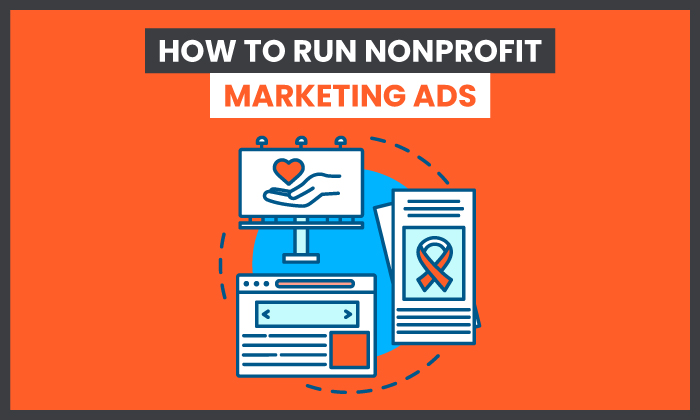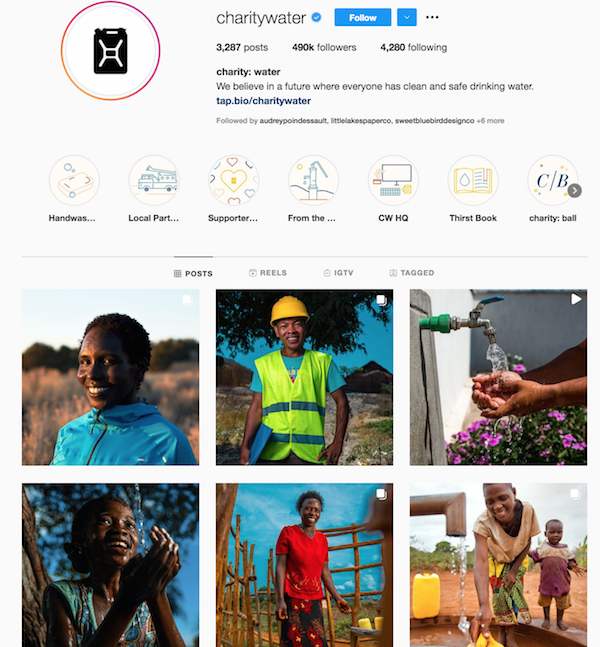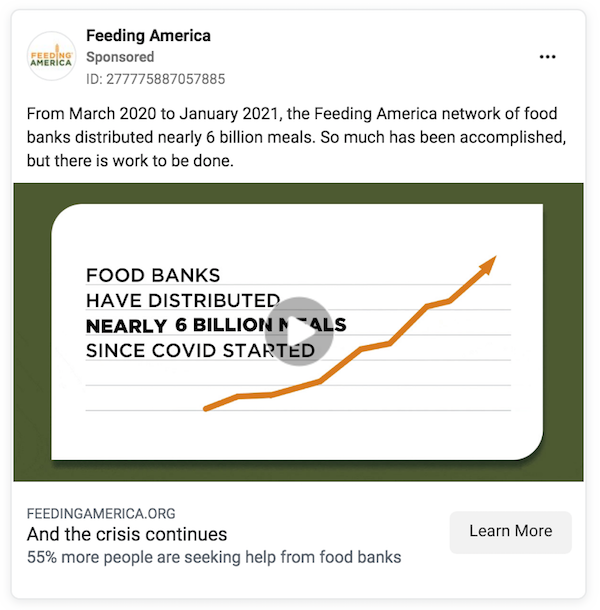
One of a for-profit business’s best investments is often their online marketing strategy.
Is the same for true for nonprofits?
Let’s take a look at how nonprofit marketing strategy is different from for-profit strategy and how nonprofit corporations may be able to better reach their goals by further leveraging digital marketing.
What Makes Nonprofit Marketing Different From Marketing in Other Fields?
The main difference for nonprofit marketing is about the goals. Often, with a for-profit company, the goal in advertising is the sale at the end. A nonprofit may have other needs in mind, and therefore other goals for the marketing campaign. We will dive more into detail on this in a bit.
It Has More Complicated Messaging
Think about your messaging. It’s not just about a transactional sale, so you want to be clear as well as inspiring. This is part of what makes nonprofit marketing difficult. People are used to being shown ads for a shoe or a new table. They can filter that out mentally or get on board and buy the product.
With nonprofit marketing, you’ve got a taller order. You’re not just trying to convert a sale. You may be trying to convert a mindset, or at least connect with a mindset that the person already has. You’re trying to appeal to values and aspirations for the world at large.
That’s asking a lot of a small social media ad, a video, a banner, or whatever other method you are using.
Its Main Goal Is Making It about Others
However, it’s not impossible. In fact, in some ways, you could think of this as more straightforward. Why? One thing people struggle with when trying to sell a product is not making it all about themselves and the product. There’s always the “why” question. Why should a customer care about what you’re selling?
With a nonprofit, the mission is built in. Usually, your message isn’t even really about you. It’s about those you serve. That’s the story you can tell in your nonprofit marketing and automatically, you’re the good guy or the hero others want to rally around.

Here is an example from Charity: Water’s Instagram account. There’s a lot of faces there, with, of course, some water thrown in. Their pictures are about the results and what they are trying to do, rather than about the organization. They draw you in and entice you to click to learn more.
All the Working Parts are Different
As you’re working through your nonprofit marketing campaign components, everything is going to be different. For instance, the imagery you choose may tell a story instead of showcase a product.
Where you run the ad might change too. You can’t use a shopping ad on Google for a donation, for instance. You want to be thoughtful about where you are placing your nonprofit marketing ads and whether that’s the place people will be in the headspace to convert.
You’ll also want to think about where they are going to learn more. It’s not just an e-commerce shop. You will probably want places on your website dedicated to telling stories about what your nonprofit does, with longer-form narratives and videos, as well as plenty of opportunities to engage, such as donate buttons and email newsletter sign-ups.
Goals of Nonprofit Marketing Ads
As we just talked about, there are a lot of differences between typical marketing and nonprofit marketing. The most fundamental difference is in the goals. Sometimes with e-commerce or for-profit advertising, the goal is very obvious. Nonprofit marketing goals may be more complicated. It’s not necessarily about making a sale; rather, the advertising goals might include:
- gathering donations
- spreading awareness
- building follower base
- recruiting volunteers
- promoting an event
- encouraging involvement
Of course, every organization needs to gather money one way or another, just to keep the doors open. That’s just the nature of things.
With nonprofit marketing though, it can all feel complex. When you ask someone what the goal of an ad is, the answers may include any number of the above, maybe more.
That’s because, with nonprofits, it’s all about the mission. When you’re working in this field, you just want to keep doing better at what you’re doing. You want to reach more, make more of a difference. When you think about marketing, you want all those goals. You want more people involved, more money to run the organization, more awareness of the problems, and more awareness of the solution you provide.
However, it’s going to be key to drill down as much as you can. Get a handle on what you want this marketing campaign or set of ads to do in particular. If you have to, maybe there are a couple of subgoals, but keep it as specific as you can.
Knowing exactly what you want out of your nonprofit marketing campaign will help you evaluate how well it’s working so you can pivot and leverage the parts that are succeeding. This will help your marketing stay cost-efficient in the long term, and you will have more to show your board of directors and other key players.
5 Tips to Make Effective Nonprofit Marketing Ads
As we’ve discussed, nonprofit marketing ads can be so different from other types of ads, not only in the messaging but also in what you’re trying to accomplish. Measuring effectiveness will come down to what exactly the goal is and how you’re going to track it. Once you know that, you can start designing and developing your nonprofit marketing campaign. Here are a few tips to keep in mind as you are creating it to leverage maximum results for your goals.
1. Appeal to Emotions
We touched on this above, but let’s take a closer look at the emotional aspect of your nonprofit marketing. This comes down to the mission of your organization. what are you about? Why is your mission so vitally important?
Emotions of “Why?”
First, let’s talk about how emotions are relevant to any kind of marketing. Even if you’re selling a shoe, people want to know why they should buy that shoe. As in, why should they really? How are they going to feel after having that shoe? What kind of connections will they have with others because of the shoe?
Does that sound far-fetched? Well, think about Michael Jordan’s sneakers for a moment and it’s suddenly not so crazy.
The great thing about your nonprofit marketing is the emotional appeal is not a stretch. It won’t take you long to come up with stories and testimonials that speak to why your organization is changing lives and the planet.
Lean into those and let them drive your marketing.
Emotions of Urgency
Urgency is part of the emotional appeal, but with a specific drive. You want people to understand why your work is vital now, as well as why their support is vital.
Getting people to act is the foundational goal of any ad so building in urgency can help that happen faster.
Don’t fake it, though. This isn’t about drumming up fake urgency, which makes your organization sound slimy. Look at your data and share the numbers to help people understand why what you’re doing is important and why you need them.

In their Facebook sponsored ads, Feeding America highlights the number of meals they have distributed as well as highlight the urgency of needing to deliver even more. It ends with a call to action to learn more about the organization.
2. Clear CTAs
If you want to know if your ad is effective, you’re going to need to track how people interact with it. Beyond that, it needs to be very obvious what you want them to do next and how they can go about doing it.
Think about goals, and write calls to action that speak to those goals. Here are some examples:
- If you need donations, say “Donate Now.”
- If you need awareness, say “Learn More.”
- If you need followers and volunteers, say “Join Us.”
Make sure once they click or do what you’ve asked them to do, the next step is just as easy. Build a great landing page that shares more of your story and inspires action.
3. Make Donate Options Easy
You may not be trying to sell a product, but you may be gathering donations. Whether it’s an annual fund drive or a critical need that needs to be covered, nonprofit marketing can help raise awareness of that need for donations.
To be as effective as possible with a donation drive, include as many ways to donate as possible:
- Set up an easy and automatic payment via credit card, PayPal, Venmo, and other integrations.
- Make it clear where they can send donations if they prefer a slower method, such as a check.
- Give a phone option, or at least email, for anyone having trouble donating online.
Make sure to include an opportunity to sign up for your newsletter or otherwise stay in touch with you as they are donating.
4. Gather Followers
With nonprofit marketing, it isn’t always about immediate action. Sure, you may want some donations or shares of your content, but there’s also an important long game driving your initiative.
As you are creating your campaigns, make it clear how to join the mission and align with what you’re about.
You can gather email addresses or provide a section on your website where people can learn more about local events or gatherings.
One of the easiest ways to do this is to include links to your social media accounts. Make sure your social media is filled with pictures and videos that highlight what you do. If your accounts are new, be sure to upload a dozen or so photos and videos to make them look full and scrollable. Use the daily features, such as Instagram Stories, to make it clear it’s an active account. Make it enticing to follow, with recent updates so they know if they follow, they will continue to learn more.
5. Look for Grants and Other Opportunities
For nonprofit marketing, grant opportunities exist to help get your message out there for a reduced price or costs covered. Depending on your goals and where you want to place your ads, you may want to take the time to apply for these, save money, and learn more from the provider about how to create effective ads. Here are a few examples to get you started:
Google Ad Grants
Google Ad Grants provide some free search ads to eligible nonprofit organizations as account support and other resources. You can also browse the Google Ad Grants site to see examples of other nonprofits running effective campaigns.
Twitter for Good
Twitter for Good provides free ads, as well as marketing campaign support and a variety of resources, such as custom emoji options, to nonprofits that join. This program focuses on areas of interest like internet safety, freedom of speech, equality, environmental conservation, and crisis management. Organizations involved in those areas may wish to apply.
How to Make Successful Nonprofit Marketing Ads
5 Ways to Ensure Your Nonprofit Ads Achieve Their Goals
- Appeal to emotion
Tug on your reader’s heartstrings so they open their pursestrings.
- Include clear CTAs
Include buttons and clear statements that make it obvious to your users what action they should take next (like donate, follow, share, etc.)
- Make donate options easy
Give clear instructions on how users can provide donations and offer as many methods of payment as you can.
- Gather followers
The more followers you have, the more likely you are to get donations and spread awareness about the causes behind your nonprofit. To gain followers, be active on social media, host events, network, etc.
- Look for Grants and Other Opportunities
Some platforms, like Google and Twitter, allow you to run ads for free. Be on the lookout for opportunities like these!
Conclusion
Nonprofit marketing can seem more complicated on the surface, with a larger mission and lots of different ways to engage with people. However, when you dive into the messaging, it often becomes a little easier. Nonprofits have a great story to tell, which can work into content marketing with ease. As you develop ads for your nonprofit marketing, focusing on an achievable goal can help ensure your ads are effective and keep your spending at a minimum.
If you are a nonprofit needing help with your digital strategy, reach out. Our team of experts can help!
How are you going to evolve your next nonprofit marketing campaign to make it more effective?
via https://AiUpNow.com May 7, 2021 at 11:18AM by Neil Patel, Khareem Sudlow,
